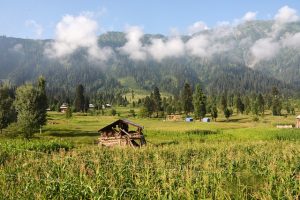平和ボケした私に「人は何故戦うの?」パキスタン人留学生の素朴な質問?

平和ボケした私に「人は何故戦うの?」パキスタン人留学生の素朴な質問?
世界は今も戦いの最中を体感!
現在(2024年6月)ウクライナ侵攻やイスラエルとハマスの戦いなど世界各地で
大きな争いが続いていますが、そうした中で
最近知り合いとなったパキスタンからの若い女性留学生の話です。
彼女は、祖国では社会衛生学を学んでいたそうです。
しかし、日本の大学では農学部の生体系の健康管理?学を学んでいる様です。
国内ではその内容に一番近い学問の様です。汗
彼女は、小柄でスマートな体系ですが、目が大きくて鼻が高い知的で
賢そうなタイプ!
ヒジャブを身にまとっているのでイスラム教信者だと思います。
彼女に、この街の印象を聞くと
「この町は大好きコンパクトで安心安全ですね」
「また、私は大都会の人混み、群衆が好きではないですね」と応えました。
更に、好きな食べ物を聞くと
「好物は寿司。焼き肉も良いけど〜、はやり寿司が一番」との事!
この後もしばらくお天気などの雑談を続けていました。
しかし、突然そんな彼女からは意外な質問が飛んできました。
「人はなぜ争うの?戦うの?」と真面目な顔で聞かれました!
私はかなり戸惑いました!彼女はパキスタン人なので
今でも隣国インドと国境で争っているのでその関連かな?と思い
「貴女の国、皆さんもインド人が嫌いで争っているの?」と言うと
彼女を笑いながら、大きく顔を振り、「そんなことはない一般人は
お互いに仲が良いよ」と応えました!「仲が悪いのは政府だけよ」と
応えました。
また、彼女は
「日本人は隣国、韓国、中国と仲が悪いとも聞くけど?」と聞きました。
私は、「国、政府は一部で仲が悪いけどお互いに一般人は悪くないし、
仲良く交流は続いているよ」と言うと少し安心したみたいです!
私は両国の事をほとんど知らないので、少しインドとパキスタンの
関係を調べてみました。
インドとパキスタンの関係は、地理的には隣国でもあり、歴史的、政治的、宗教的、
文化的な要因が複雑に絡み合っていて、現在でも緊張が続いています。
その主な要点は、歴史的背景として
インドとパキスタンの関係の転換点は、1947年のイギリスからの独立と
同時に始まりました。
この時、宗教を基にしてインド(主にヒンドゥー教徒)と
パキスタン(主にイスラム教徒)に分割されました。
この分割により、多くの暴力事件と大量の難民移動が発生しました。
そして、「カシミール紛争」です。

独立以来、インドとパキスタンはカシミール地方の領有権を巡って対立していて、
これまでに三度の戦争(1947-1948年、1965年、1999年)と
数多くの小競り合いが起こっています。
現在もカシミールはインドとパキスタンの双方により部分的に
統治されていますが、緊張が続いています。
そこで、私の体験から「戦争、紛争は各国のプライドであり一部の人の
ビジネス(武器商人)となっている!」と言うとかなり不思議そうな
顔をしていました!
私は以前学んだ事から 戦争は 大きく3つの要因があるとも説明しました。
その、3つは「領土」「宗教」「民族」
そして、約30年前 当時西ドイツのボン大学の心理学の研究者と
戦争について話し合った事を説明しました。
日本と西ドイツは第二次世界大戦で敗北し、世界平和を誓って
近代国家として努力してきました。
そうした中で、戦後も世界ではいろいろな戦いが絶え間なく続いている。
そこで、私は研究者に 「大きな世界大戦を防ぐために局地戦が
必要なのでは?」と!
「局地戦で大きな被害が出てそれをアピールしてそれを反面教師にして、
より大きな戦いを避ける対処法にしているのでは?」と話しました。
その時、研究者 暫く聞いていたが 静かにうなずいて
「そうかもしれない」と静かに語った事を話しました。
彼女は静かに聞いていましたが、あまり納得はしていない様でした。
「なにか~」追加で言いたそうでしたが、言葉にはしませんでした。
若い人なので「そんな事もあるのかな?」と言う感じでした。

現在 戦争、紛争している国の人には戦争は決して他人事ではなく
自分自身の事と考える様な真剣さが感じられる一時でした。
はやり、個人的には、島国の日本では、大陸の国境を接した国々の争いは、
肌感覚では分かりにくい事だとも感じます。
そして、戦後約80年を迎え、私を含め平和ボケした日本人には分かりにくい事かもしれません。
しかし、アジアでもフィリピン、台湾を含め小競り合いが続いています。
今後も永遠に、戦争が実体験として語られない事を願っています。
次回に続く。

A Pakistani exchange student’s simple question,
“Why do people fight?” took me by surprise,
having grown complacent in peacetime.
The world is still experiencing conflicts!
Currently (June 2024), major conflicts such as the invasion of Ukraine and
the battle between Israel and Hamas continue around the world.
Amidst this, I recently got to know a young female exchange student from Pakistan.
She mentioned that she had studied social hygiene in her home country but
is now studying health management in the ecosystem
within the Faculty of Agriculture at a Japanese university.
This field seems to be the closest to her interests here in Japan.
She is small, slim, with large eyes and an intelligent appearance,
often wearing a hijab, indicating she is Muslim.
When I asked her impression of this city, she said,
“I love this town. It’s compact, safe, and secure,” and added,
“I’m not fond of the crowds in big cities.” When asked about her favorite food,
she replied, “I love sushi. Yakiniku is good too, but sushi is the best!”
We continued chatting about the weather and other small talk.
However, she suddenly asked me a serious question, “Why do people fight?”
I was quite puzzled.
Thinking it might be related to the ongoing border conflicts
between her country and India,
I asked, “Do people in your country also dislike Indians and fight with them?”
She laughed and shook her head, saying,
“Not at all, ordinary people get along well.”
She added, “Only the governments have issues.”
She also asked, “I’ve heard that Japanese people have bad relations with
neighboring countries like Korea and China.
Is that true?” I replied, “Some parts of our governments may have issues,
but ordinary people get along well and maintain friendly exchanges,”
which seemed to reassure her a bit.
Knowing little about the relations between the two countries,
I decided to research the India-Pakistan relationship.
Despite being neighboring countries, their relationship is complex,
involving historical, political, religious, and cultural factors,
and tensions persist to this day. The key points include:
Historical Background
The turning point in India-Pakistan relations began with
their independence from Britain in 1947.
The partition based on religion divided India (mainly Hindu) and
Pakistan (mainly Muslim),
leading to numerous violent incidents and mass refugee movements.
The Kashmir conflict also stems from this period.

Since independence, India and Pakistan have clashed over Kashmir,
resulting in three wars (1947-1948, 1965, 1999) and numerous skirmishes.
Kashmir remains partially governed by both countries, with ongoing tensions.
Reflecting on my own experiences,
I told her, “Wars and conflicts often stem from national pride and
are sometimes driven by the business interests of a few (like arms dealers).”
She seemed puzzled by this. I explained from what I had learned that
wars generally have three major causes: territory, religion, and ethnicity.
I also shared a conversation I had about 30 years ago with
a psychology researcher from Bonn University in West Germany.
Both Japan and West Germany were defeated in World War II and
have since worked hard to uphold world peace as modern nations.
However, conflicts continue around the world even after the war.
I suggested to the researcher that
“perhaps local conflicts are necessary to prevent large-scale world wars.”
I argued that the severe impact of localized conflicts might serve as
a deterrent to larger wars. The researcher listened quietly and then nodded, saying,
“That might be true.” I recounted this conversation to her.
She listened quietly but didn’t seem entirely convinced.
She looked as if she had something more to say but didn’t express it.
In the present day,
people in conflict-ridden countries see war not as someone else’s problem but
as a serious personal issue.

For those of us in Japan, an island nation,
it’s difficult to fully grasp the conflicts that occur in countries with shared borders.
As we approach 80 years since World War II,
it may be hard for peace-complacent Japanese people, including myself,
to understand these issues.
However, skirmishes continue in Asia, including in the Philippines and Taiwan.
I hope that in the future,
wars will never be something people have to personally experience.
To be continued.

